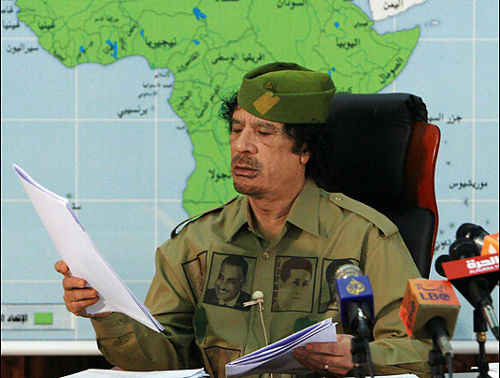
Libyan leader Muammar Gaddafi, the founder of the Al-Fateh Revolution of September 1, 1969. Gaddafi is mounting resistance to the imperialist invasion of his oil-rich North African state., a photo by Pan-African News Wire File Photos on Flickr.
Army sent to quell clashes in western Libya
2:38pm EDT
TRIPOLI (Reuters) - Libya's government has sent troops to put an end to six days of clashes between rival militias in the west of the country, the latest spasm of instability eight months after Muammar Gaddafi's overthrow.
As it seeks to impose its authority on a fractious country, Libya's new leadership on Saturday called for an immediate ceasefire in the fighting south of the capital, in which at least 14 people have been killed and 89 injured.
The clashes have pitted fighters from the town of Zintan, who played a big role in ousting Gaddafi in last year's war, against members of the El-Mashashia tribe, who chose not to join the rebellion, security officials said.
Resentment between the two groups spilled over into fighting in December, when at least four people were killed, and erupted again this week when a Zintan fighter was shot dead.
Zintan's militias blamed the El-Mashashia tribe and retaliated, leading to the current flare-up, which started on Monday, several members of the tribe said.
"The army is going there now to impose a ceasefire and protect civilians," the army's Colonel Hamed Zwei told Reuters.
A security source said heavy fighting continued on Saturday, resulting in many casualties.
"The injured are being taken to hospitals in the area as well as Tripoli, there are so many," he said.
Haramain Mohammed Haramain, one of Libya's three deputy prime ministers, read out a statement to reporters saying the interim government, ruling National Transitional Council and religious leaders were all calling for an immediate ceasefire.
Declaring the area a military zone, he said the government had issued instructions to the chief of armed staff and interior ministry to use force if the ceasefire was not respected.
Gaddafi's repressive rule kept in check the deep-running animosities in Libyan society, which often pit villages, cities or tribes against their neighbors. When he was forced from power last year, old feuds re-surfaced.
The flare-ups of violence, mostly in the southern Sahara and mountainous west, show how little authority the interim government has over a myriad armed groups.
Libya's NTC and its Western backers hope the violence will not jeopardize a July 7 election for a national assembly.
(Reporting by Ali Shuaib; Writing by Marie-Louise Gumuchian; Editing by Andrew Roche)
No comments:
Post a Comment